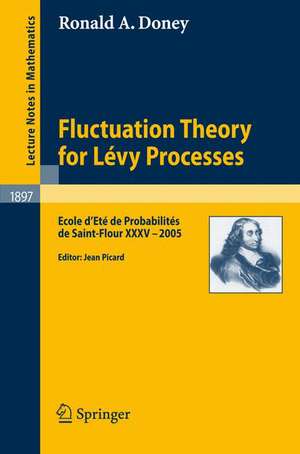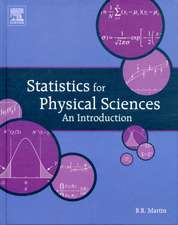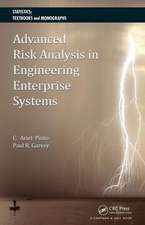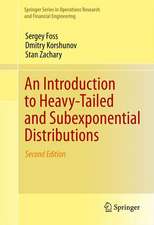Fluctuation Theory for Lévy Processes: Ecole d'Eté de Probabilités de Saint-Flour XXXV - 2005: Lecture Notes in Mathematics, cartea 1897
Autor Ronald A. Doney Editat de Jean Picarden Limba Engleză Paperback – 19 apr 2007
Din seria Lecture Notes in Mathematics
- 17%
 Preț: 360.43 lei
Preț: 360.43 lei -
 Preț: 459.92 lei
Preț: 459.92 lei -
 Preț: 121.41 lei
Preț: 121.41 lei -
 Preț: 175.68 lei
Preț: 175.68 lei -
 Preț: 197.00 lei
Preț: 197.00 lei -
 Preț: 279.76 lei
Preț: 279.76 lei -
 Preț: 477.66 lei
Preț: 477.66 lei - 17%
 Preț: 361.89 lei
Preț: 361.89 lei -
 Preț: 252.37 lei
Preț: 252.37 lei -
 Preț: 353.99 lei
Preț: 353.99 lei -
 Preț: 138.88 lei
Preț: 138.88 lei -
 Preț: 152.61 lei
Preț: 152.61 lei -
 Preț: 116.67 lei
Preț: 116.67 lei -
 Preț: 102.77 lei
Preț: 102.77 lei - 17%
 Preț: 365.53 lei
Preț: 365.53 lei -
 Preț: 396.76 lei
Preț: 396.76 lei - 17%
 Preț: 362.15 lei
Preț: 362.15 lei -
 Preț: 396.13 lei
Preț: 396.13 lei -
 Preț: 357.80 lei
Preț: 357.80 lei - 17%
 Preț: 362.31 lei
Preț: 362.31 lei -
 Preț: 403.81 lei
Preț: 403.81 lei - 17%
 Preț: 361.73 lei
Preț: 361.73 lei -
 Preț: 499.87 lei
Preț: 499.87 lei -
 Preț: 457.03 lei
Preț: 457.03 lei -
 Preț: 395.91 lei
Preț: 395.91 lei -
 Preț: 459.00 lei
Preț: 459.00 lei -
 Preț: 487.57 lei
Preț: 487.57 lei -
 Preț: 424.01 lei
Preț: 424.01 lei -
 Preț: 487.57 lei
Preț: 487.57 lei -
 Preț: 330.55 lei
Preț: 330.55 lei -
 Preț: 325.75 lei
Preț: 325.75 lei -
 Preț: 350.30 lei
Preț: 350.30 lei -
 Preț: 331.31 lei
Preț: 331.31 lei -
 Preț: 408.37 lei
Preț: 408.37 lei -
 Preț: 328.25 lei
Preț: 328.25 lei -
 Preț: 421.28 lei
Preț: 421.28 lei -
 Preț: 276.08 lei
Preț: 276.08 lei -
 Preț: 424.60 lei
Preț: 424.60 lei -
 Preț: 422.05 lei
Preț: 422.05 lei -
 Preț: 505.01 lei
Preț: 505.01 lei -
 Preț: 422.05 lei
Preț: 422.05 lei -
 Preț: 274.93 lei
Preț: 274.93 lei -
 Preț: 335.16 lei
Preț: 335.16 lei -
 Preț: 422.27 lei
Preț: 422.27 lei -
 Preț: 497.49 lei
Preț: 497.49 lei -
 Preț: 272.81 lei
Preț: 272.81 lei -
 Preț: 428.04 lei
Preț: 428.04 lei -
 Preț: 376.22 lei
Preț: 376.22 lei -
 Preț: 427.10 lei
Preț: 427.10 lei -
 Preț: 325.92 lei
Preț: 325.92 lei
Preț: 347.74 lei
Nou
Puncte Express: 522
Preț estimativ în valută:
66.54€ • 71.15$ • 55.48£
66.54€ • 71.15$ • 55.48£
Carte tipărită la comandă
Livrare economică 18 aprilie-02 mai
Preluare comenzi: 021 569.72.76
Specificații
ISBN-13: 9783540485100
ISBN-10: 3540485104
Pagini: 158
Ilustrații: IX, 155 p.
Dimensiuni: 155 x 235 x 12 mm
Greutate: 0.25 kg
Ediția:2007
Editura: Springer Berlin, Heidelberg
Colecția Springer
Seriile Lecture Notes in Mathematics, École d'Été de Probabilités de Saint-Flour
Locul publicării:Berlin, Heidelberg, Germany
ISBN-10: 3540485104
Pagini: 158
Ilustrații: IX, 155 p.
Dimensiuni: 155 x 235 x 12 mm
Greutate: 0.25 kg
Ediția:2007
Editura: Springer Berlin, Heidelberg
Colecția Springer
Seriile Lecture Notes in Mathematics, École d'Été de Probabilités de Saint-Flour
Locul publicării:Berlin, Heidelberg, Germany
Public țintă
ResearchCuprins
to Lévy Processes.- Subordinators.- Local Times and Excursions.- Ladder Processes and the Wiener–Hopf Factorisation.- Further Wiener–Hopf Developments.- Creeping and Related Questions.- Spitzer's Condition.- Lévy Processes Conditioned to Stay Positive.- Spectrally Negative Lévy Processes.- Small-Time Behaviour.
Textul de pe ultima copertă
Lévy processes, i.e. processes in continuous time with stationary and independent increments, are named after Paul Lévy, who made the connection with infinitely divisible distributions and described their structure. They form a flexible class of models, which have been applied to the study of storage processes, insurance risk, queues, turbulence, laser cooling, ... and of course finance, where the feature that they include examples having "heavy tails" is particularly important. Their sample path behaviour poses a variety of difficult and fascinating problems. Such problems, and also some related distributional problems, are addressed in detail in these notes that reflect the content of the course given by R. Doney in St. Flour in 2005.
Caracteristici
Includes supplementary material: sn.pub/extras












